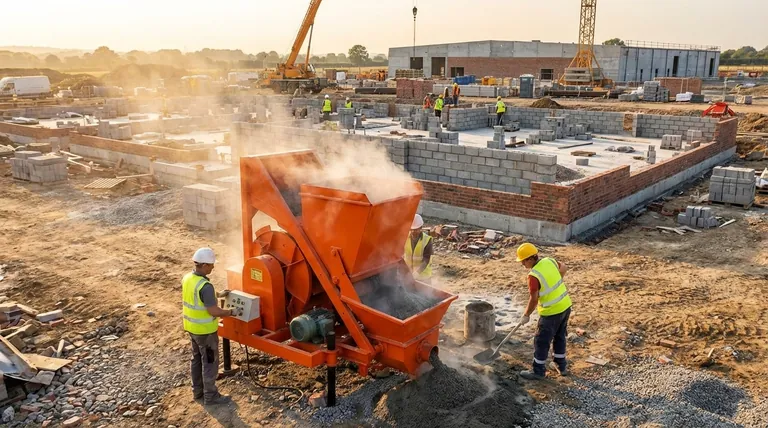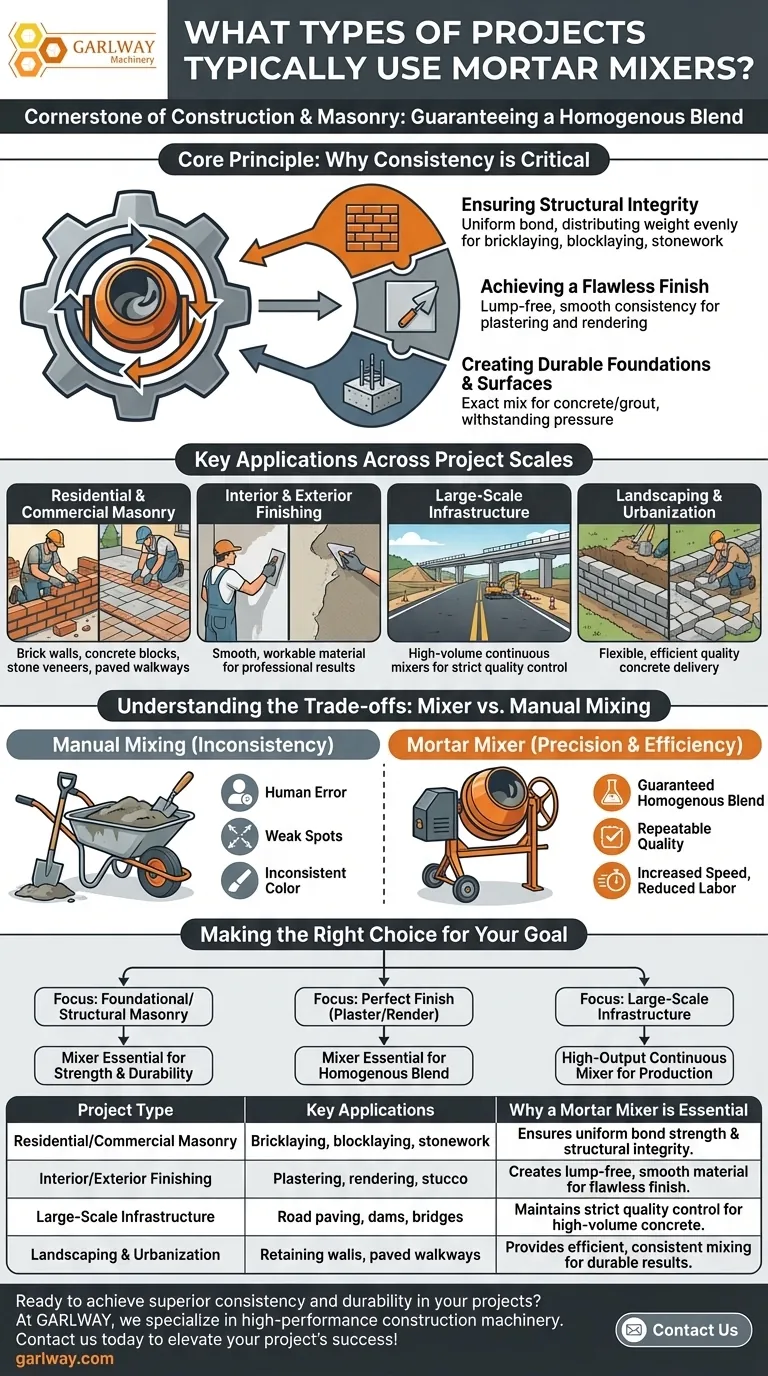Mortar mixers are a cornerstone of construction and masonry, serving a wide range of applications that depend on a high-quality, consistent blend of materials. They are primarily used in projects like bricklaying, blocklaying, stonework, and plastering, but also extend to larger-scale concrete work for paving, foundations, and major infrastructure.
The core value of a mortar mixer isn't just mixing; it's guaranteeing a uniform and homogenous blend. This consistency is the critical factor that ensures structural integrity, durability, and a flawless finish in any project that relies on cement-based materials.

The Core Principle: Why Consistency is Critical
The primary reason a mortar mixer is used is to eliminate the inconsistencies of manual mixing. A uniform mixture is predictable, reliable, and performs exactly as engineered.
Ensuring Structural Integrity
In bricklaying, blocklaying, and stonework, the mortar is the glue that holds everything together. A proper mix ensures a powerful bond, distributing weight evenly and resisting weather and structural stress. Inconsistent, poorly mixed mortar creates weak spots that can compromise the entire structure.
Achieving a Flawless Finish
For plastering and rendering, the goal is a smooth, durable surface. A mortar mixer blends the materials to a perfect, lump-free consistency. This is essential for preventing cracks, peeling, or an uneven finish on walls and ceilings over time.
Creating Durable Foundations and Surfaces
When mixing concrete or grout for foundations, floors, or paving, the blend of cement, sand, and gravel must be exact. A mixer ensures these components are evenly distributed, creating a strong, durable mixture capable of withstanding immense pressure and wear.
Key Applications Across Project Scales
Mortar mixers are not a one-size-fits-all tool. Their application varies depending on the size and demands of the job, from small residential tasks to massive civil engineering projects.
Residential and Commercial Masonry
This is the most common application. Projects include building brick walls, laying concrete blocks for foundations, installing stone veneers, and creating paved walkways or patios. The mixer ensures every batch has the same quality.
Interior and Exterior Finishing
Plastering interior walls and applying exterior render or stucco are precision tasks. A mixer provides the smooth, workable material needed for professional-grade results that last.
Large-Scale Infrastructure
For projects like road paving, dams, and bridges, high-volume continuous mixers are used. These machines can produce vast quantities of concrete per hour, maintaining the strict quality control essential for public infrastructure.
Landscaping and Urbanization
Mortar mixers are also used in landscaping for setting stones or creating small retaining walls. They offer a flexible and efficient way to deliver quality concrete for smaller urbanization projects as well.
Understanding the Trade-offs: Mixer vs. Manual Mixing
While it might seem easier to mix a small batch in a wheelbarrow, it's crucial to understand the compromises involved.
The Cost of Inconsistency
Manual mixing is highly susceptible to human error. It's nearly impossible to achieve a perfectly homogenous blend by hand, which can lead to weak spots, inconsistent color, and a greater likelihood of failure.
The Benefit of Precision
A mortar mixer removes the guesswork. It mechanically forces the materials together, guaranteeing a repeatable, high-quality batch every time. This is not just a time-saver; it is a fundamental quality assurance tool.
The Investment in Efficiency
While a mixer represents an upfront cost, it dramatically increases speed and reduces labor. The ability to produce perfect batches quickly means projects are completed faster, with less waste and a lower risk of costly rework.
Making the Right Choice for Your Goal
Selecting the right method depends entirely on the requirements of your project.
- If your primary focus is foundational work or structural masonry: A mortar mixer is non-negotiable to ensure the strength and long-term durability required.
- If your primary focus is achieving a perfect finish for plaster or render: The mixer's ability to create a completely homogenous blend is essential to prevent future cracking and peeling.
- If your primary focus is a large-scale infrastructure or industrial project: A high-output continuous mixer is the only way to meet production demands while maintaining strict quality standards.
Ultimately, using a mortar mixer is a decision to prioritize quality, consistency, and structural integrity in your work.
Summary Table:
| Project Type | Key Applications | Why a Mortar Mixer is Essential |
|---|---|---|
| Residential/Commercial Masonry | Bricklaying, blocklaying, stonework | Ensures uniform bond strength and structural integrity |
| Interior/Exterior Finishing | Plastering, rendering, stucco | Creates lump-free, smooth material for a flawless finish |
| Large-Scale Infrastructure | Road paving, dams, bridges | Maintains strict quality control for high-volume concrete production |
| Landscaping & Urbanization | Retaining walls, paved walkways | Provides efficient, consistent mixing for durable results |
Ready to achieve superior consistency and durability in your projects?
At GARLWAY, we specialize in high-performance construction machinery, including reliable mortar and concrete mixers designed for construction companies and contractors worldwide. Our equipment ensures every batch is perfectly mixed, saving you time, reducing labor costs, and guaranteeing long-lasting structural quality.
Contact us today to find the perfect mixer for your needs and elevate your project's success!
Visual Guide

Related Products
- JDC350 Small Cement Concrete Mortar Mixer
- Auto Concrete Cement Mixer Machine New
- Commercial Construction Mixer Machine for Soil Cement Mixing Concrete
- Portable Electric Concrete Mixer Machine for Cement Mixing
- Portable Concrete Mixer Machine Equipment for Mixing Concrete
People Also Ask
- Do you put water or cement in a cement mixer first? Master the Professional Layering Method
- Is there a difference between a concrete mixer and a mortar mixer? Choose the Right Machine for Your Project
- Can a concrete mixer be used for mortar? Understanding the trade-offs for your project
- How do I choose a cement mixer? Find the Perfect Match for Your Project Scale and Power Needs
- How much weight can a cement mixer hold? A Guide to Choosing the Right Size for Your Project



















